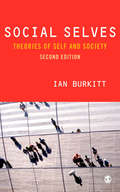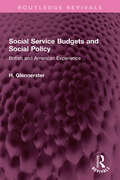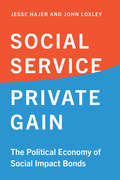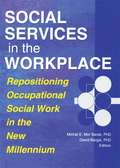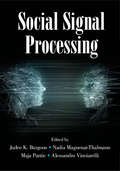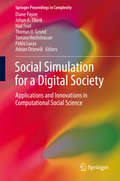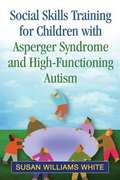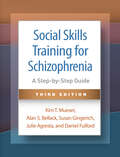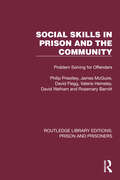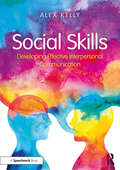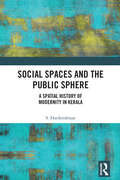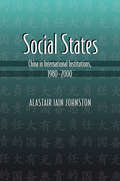- Table View
- List View
Social Selves: Theories of Self and Society
by Ian Burkitt"The first edition of this book brought difficult questions about selfhood together with equally awkward issues of power and the 'social'. Not since Mead or Goffman, perhaps, had this been attempted in such a useful way, and in such an assured and accessible text... This completely reworked second edition retains all of these virtues, and takes the original analysis into new territory, not least with new chapters on gender and class... If you're interested in identity - particularly how identity 'works' - this book is essential reading". - Richard Jenkins, Professor of Sociology, Sheffield University "A foundational book, beautifully framed for this new century. The old theories of self and identity must be revisited in these times of global and cultural transformation. What kinds of selves are now available to us? Which theories best help us make sense out of who we are today. Burkitt brilliantly charts a path through this complex set of issues, and we owe him a huge debt for doing so". - Norman K. Denzin, Distinguished Research Professor, University of Illinois at Urbana-Champaign This new, completely revised version builds on the popular success of the first edition. It seeks to answer the basic social question of 'who am I?' by developing an understanding of self-identity as formed in social relations and social activity. Comprehensive, jargon-free and authoritative, it will be required reading on courses in self and society, identity and personality formation.
Social Service Budgets and Social Policy: British and American Experience (Routledge Revivals)
by H. GlennersterFirst published in 1975, Social Service Budgets and Social Policy compares the attempts by British and US federal governments to plan and control social service expenditure. It concentrates on education, health and social security spending and begins by discussing the contrasting theories of how resource allocation does and ought to work. Then, having compared the broad economic, political and policy contexts within which social planners in the two countries have to work, it scrutinises in particular their attempts at forward planning, output budgeting and programme evaluation. It argues for more explicit and informed decisions about priorities, but as part of an open political process. This book will be of interest to students of economics, sociology and social policy.
Social Service Review, volume 96 number 4 (December 2022)
by Social Service ReviewThis is volume 96 issue 4 of Social Service Review. Founded in 1927, Social Service Review is devoted to the publication of thought-provoking, original research on pressing social issues and promising social work practices and social welfare policies. Articles in SSR analyze issues from the vantage points of a broad spectrum of disciplines, theories, and methodological traditions, at the individual, family, community, organizational, and societal levels. Social Service Review features balanced, scholarly contributions from social work and social welfare scholars and from members of the various allied disciplines engaged in research on human behavior, social systems, social structure, history, public policy, and social services.
Social Service Review, volume 97 number 1 (March 2023)
by Social Service ReviewThis is volume 97 issue 1 of Social Service Review. Founded in 1927, Social Service Review is devoted to the publication of thought-provoking, original research on pressing social issues and promising social work practices and social welfare policies. Articles in SSR analyze issues from the vantage points of a broad spectrum of disciplines, theories, and methodological traditions, at the individual, family, community, organizational, and societal levels. Social Service Review features balanced, scholarly contributions from social work and social welfare scholars and from members of the various allied disciplines engaged in research on human behavior, social systems, social structure, history, public policy, and social services.
Social Service Review, volume 97 number 2 (June 2023)
by Social Service ReviewThis is volume 97 issue 2 of Social Service Review. Founded in 1927, Social Service Review is devoted to the publication of thought-provoking, original research on pressing social issues and promising social work practices and social welfare policies. Articles in SSR analyze issues from the vantage points of a broad spectrum of disciplines, theories, and methodological traditions, at the individual, family, community, organizational, and societal levels. Social Service Review features balanced, scholarly contributions from social work and social welfare scholars and from members of the various allied disciplines engaged in research on human behavior, social systems, social structure, history, public policy, and social services.
Social Service Review, volume 97 number 3 (September 2023)
by Social Service ReviewThis is volume 97 issue 3 of Social Service Review. Founded in 1927, Social Service Review is devoted to the publication of thought-provoking, original research on pressing social issues and promising social work practices and social welfare policies. Articles in SSR analyze issues from the vantage points of a broad spectrum of disciplines, theories, and methodological traditions, at the individual, family, community, organizational, and societal levels. Social Service Review features balanced, scholarly contributions from social work and social welfare scholars and from members of the various allied disciplines engaged in research on human behavior, social systems, social structure, history, public policy, and social services.
Social Service Review, volume 97 number 4 (December 2023)
by Social Service ReviewThis is volume 97 issue 4 of Social Service Review. Founded in 1927, Social Service Review is devoted to the publication of thought-provoking, original research on pressing social issues and promising social work practices and social welfare policies. Articles in SSR analyze issues from the vantage points of a broad spectrum of disciplines, theories, and methodological traditions, at the individual, family, community, organizational, and societal levels. Social Service Review features balanced, scholarly contributions from social work and social welfare scholars and from members of the various allied disciplines engaged in research on human behavior, social systems, social structure, history, public policy, and social services.
Social Service Review, volume 98 number 1 (March 2024)
by Social Service ReviewThis is volume 98 issue 1 of Social Service Review. Founded in 1927, Social Service Review is devoted to the publication of thought-provoking, original research on pressing social issues and promising social work practices and social welfare policies. Articles in SSR analyze issues from the vantage points of a broad spectrum of disciplines, theories, and methodological traditions, at the individual, family, community, organizational, and societal levels. Social Service Review features balanced, scholarly contributions from social work and social welfare scholars and from members of the various allied disciplines engaged in research on human behavior, social systems, social structure, history, public policy, and social services.
Social Service Review, volume 98 number 2 (June 2024)
by Social Service ReviewThis is volume 98 issue 2 of Social Service Review. Founded in 1927, Social Service Review is devoted to the publication of thought-provoking, original research on pressing social issues and promising social work practices and social welfare policies. Articles in SSR analyze issues from the vantage points of a broad spectrum of disciplines, theories, and methodological traditions, at the individual, family, community, organizational, and societal levels. Social Service Review features balanced, scholarly contributions from social work and social welfare scholars and from members of the various allied disciplines engaged in research on human behavior, social systems, social structure, history, public policy, and social services.
Social Service Review, volume 98 number 3 (September 2024)
by Social Service ReviewThis is volume 98 issue 3 of Social Service Review. Founded in 1927, Social Service Review is devoted to the publication of thought-provoking, original research on pressing social issues and promising social work practices and social welfare policies. Articles in SSR analyze issues from the vantage points of a broad spectrum of disciplines, theories, and methodological traditions, at the individual, family, community, organizational, and societal levels. Social Service Review features balanced, scholarly contributions from social work and social welfare scholars and from members of the various allied disciplines engaged in research on human behavior, social systems, social structure, history, public policy, and social services.
Social Service Review, volume 98 number 4 (December 2024)
by Social Service ReviewThis is volume 98 issue 4 of Social Service Review. Founded in 1927, Social Service Review is devoted to the publication of thought-provoking, original research on pressing social issues and promising social work practices and social welfare policies. Articles in SSR analyze issues from the vantage points of a broad spectrum of disciplines, theories, and methodological traditions, at the individual, family, community, organizational, and societal levels. Social Service Review features balanced, scholarly contributions from social work and social welfare scholars and from members of the various allied disciplines engaged in research on human behavior, social systems, social structure, history, public policy, and social services.
Social Service Review, volume 99 number 1 (March 2025)
by Social Service ReviewThis is volume 99 issue 1 of Social Service Review. Founded in 1927, Social Service Review is devoted to the publication of thought-provoking, original research on pressing social issues and promising social work practices and social welfare policies. Articles in SSR analyze issues from the vantage points of a broad spectrum of disciplines, theories, and methodological traditions, at the individual, family, community, organizational, and societal levels. Social Service Review features balanced, scholarly contributions from social work and social welfare scholars and from members of the various allied disciplines engaged in research on human behavior, social systems, social structure, history, public policy, and social services.
Social Service Review, volume 99 number 2 (June 2025)
by Social Service ReviewThis is volume 99 issue 2 of Social Service Review. Founded in 1927, Social Service Review is devoted to the publication of thought-provoking, original research on pressing social issues and promising social work practices and social welfare policies. Articles in SSR analyze issues from the vantage points of a broad spectrum of disciplines, theories, and methodological traditions, at the individual, family, community, organizational, and societal levels. Social Service Review features balanced, scholarly contributions from social work and social welfare scholars and from members of the various allied disciplines engaged in research on human behavior, social systems, social structure, history, public policy, and social services.
Social Service, Private Gain: The Political Economy of Social Impact Bonds
by John Loxley Jesse HajerThe 2008 financial crisis and its subsequent economic impacts generated a challenge for national and regional governments across the world. From this economic ruin, the Social Impact Bond (SIB) was born as an alternative mechanism for government procurement and delivery of social public services. Social Service, Private Gain examines the evolution of SIBs, how they work, their theoretical motivation, and their global proliferation. The book critically assesses the potential of SIBs to constructively contribute to solving the multifaceted social challenges emerging from a context of entrenched and growing inequality. Claiming to bring incremental resources to the rescue, SIBs have taken up disproportionate space with new legislation, policy, subsidies, institutional supports, lobbyists, and "intermediaries" facilitating SIBs and thriving on their associated transaction costs. Drawing on mainstream and heterodox economic theory, practical case studies, and empirical data, Jesse Hajer and John Loxley generate new insights based on the limited but still suggestive publicly available data on SIB projects. Challenging the assumptions and narratives put forward by proponents of the model, they offer practical policy recommendations for SIBs and explain what the model tells us about the potential for transformational change for the better.
Social Services for Gay and Lesbian Couples
by Lawrence A KurdekHere is an essential resource filled with advice for providing social services to gay and lesbian couples. Despite myths to the contrary, many gay men and lesbians form long-term couples relationships. Unfortunately, many professionals working in the area of social services lack training with regard to the special needs of gay/lesbian couples. Social Services for Gay and Lesbian Couples helps fill this gap by providing information on diverse aspects of gay and lesbian domestic partnerships for social services workers.The contributing authors highlight the unique characteristics of gay and lesbian couples relationships and provide valuable information on the special social services these couples may need. Social Services for Gay and Lesbian Couples includes the results of a survey that divulge basic, descriptive information on the nature of gay and lesbian couples. These in-depth statistics reveal couples’perspectives on relationship length, commitment, and quality, terms of address for partners, finances, relationship experience, discrimination, living situation, sex, first meetings, support and challenges for the relationship, children, legal arrangements, and concerns about HIV and AIDS. In addition to revealing specific information about gay and lesbian couples, Social Services for Gay and Lesbian Couples also explores the therapeutic implications of this knowledge for social service providers. Chapters discuss specific situations in gay and lesbian relationships about which social workers should be informed, such as the factors involved in the formation of lesbian identities and issues encountered by gay couples when one partner is HIV-infected and the other is not. Also addressed are the special needs of gay or lesbian couples who wish to be parents, complete with descriptions of innovative services and the names, addresses, and phone numbers of national organizations that provide resources for gay or lesbian parents.
Social Services for Senior Gay Men and Lesbians
by Jean K QuamSocial Services for Senior Gay Men and Lesbians is an important new reference that provides those in the helping professions with practical information on how to work with the older gay and lesbian population. Although older gays and lesbians are the same in many ways as their heterosexual counterparts, they have an extra “layer” of concerns that are unique to their sexual orientation, including “coming out” to family and medical professionals, fear of discrimination, isolation, and loneliness. This new book helps social service providers address these and other concerns of the aging homosexual.Social Services for Senior Gay Men and Lesbians examines the history of homosexuality and how practitioners have developed ways to better serve this population. The book features case studies of topics that face practitioners and their older gay clients, including: housing needs of older gay and lesbian adults group therapy for older gay males long-term care dilemmas for older lesbians counseling an older gay male who is “coming out” staff development for non-gay social service providers historical review of gay and lesbian issuesBecause so little information exists in these and other areas, Social Services for Older Gay Men and Lesbians is an excellent resource for social workers, psychologists, nurses, counselors, and physicians.
Social Services in the Workplace: Repositioning Occupational Social Work in the New Millennium
by David Bargal Michal E. Mor BarakDiscover the challenges and pitfalls awaiting occupational social workers in the coming years!Social Services in the Workplace: Repositioning Occupational Social Work in the New Millennium will help you meet the challenges that the rapidly changing world of work today presents. These challenges offer new opportunities for you as a social work professional in general and for the field of occupational social work in particular. Globalizing economies, downsizing, rightsizing, mergers, and corporate acquisitions continue to challenge work organizations and impact the lives of workers and their families. These trends have led to an increased need for the provision of social work services to employed, unemployed, and transitional workers and their families, and to businesses of all types and sizes. To meet the challenges facing the world of work in the 21st century, the social work profession must put special emphasis on the diverse roles that social workers can take in the workplace--from the micro to the macro--both within workplace settings and in the context of more traditional local, national and global agencies.Social Services in the Workplace proposes an expanded paradigm for social work practice in the context of the workplace, spanning the gamut from corporate and union settings to 'workfare’or welfare-to-work programs. It provides a wide array of theoretical, conceptual, and empirical examinations of evolving and innovative roles that the social work profession can fulfill in the world of work. Given today's volatile global market conditions, which dictate rapid changes in the organization and conditions of work, Social Services in the Workplace examines opportunities and dilemmas for the social work profession and points to the paths that the profession must take in the near future to remain viable.Social Services in the Workplace focuses on: defining domains for practice techniques that work and aspects to emphasize in various workplace environments provision of social work services to workers and their families welfare-to-work programs formulating organizational policies and proceduresSocial Services in the Workplace: Repositioning Occupational Social Work in the New Millennium brings into focus the practice of social work in the workplace. With this book, social work students and practitioners can gain a new perspective on the field and learn of new opportunities for employment and practice in the world of work. Academicians can use the book in their Social Work Practice classes, and researchers will discover ideas that will spark innovative research in this field. Corporate executives and human resource managers will gain a new understanding of how the social work profession can benefit their employees, their families, and the work organization. No matter which of these categories you fit into, Social Services in the Workplace will shed light on this expanding field.
Social Signal Processing
by Nadia Magnenat-Thalmann Judee K. Burgoon Alessandro Vinciarelli Maja Pantic"Social Signal Processing is the first book to cover all aspects of the modeling, automated detection, analysis, and synthesis of nonverbal behavior in human-human and human-machine interactions. Authoritative surveys address conceptual foundations, machine analysis and synthesis of social signal processing, and applications. Foundational topics include affect perception and interpersonal coordination in communication; later chapters cover technologies for automatic detection and understanding such as computational paralinguistics and facial expression analysis and for the generation of artificial social signals such as social robots and artificial agents. The final section covers a broad spectrum of applications based on social signal processing in healthcare, deception detection, and digital cities, including detection of developmental diseases and analysis of small groups. Each chapter offers a basic introduction to its topic, accessible to students and other newcomers, and then outlines challenges and future perspectives for the benefit of experienced researchers and practitioners in the field"--
Social Simulation for a Digital Society: Applications and Innovations in Computational Social Science (Springer Proceedings in Complexity)
by Johan A. Elkink Diane Payne Nial Friel Thomas U. Grund Tamara Hochstrasser Pablo Lucas Adrian Ottewill“Social Simulation for a Digital Society” provides a cross-section of state-of-the-art research in social simulation and computational social science. With the availability of big data and faster computing power, the social sciences are undergoing a tremendous transformation. Research in computational social sciences has received considerable attention in the last few years, with advances in a wide range of methodologies and applications. Areas of application of computational methods range from the study of opinion and information dynamics in social networks, the formal modeling of resource use, the study of social conflict and cooperation to the development of cognitive models for social simulation and many more. This volume is based on the Social Simulation Conference of 2017 in Dublin and includes applications from across the social sciences, providing the reader with a demonstration of the highly versatile research in social simulation, with a particular focus on public policy relevance in a digital society. Chapters in the book include contributions to the methodology of simulation-based research, theoretical and philosophical considerations, as well as applied work. This book will appeal to students and researchers in the field.
Social Skills Training for Children with Asperger Syndrome and High-Functioning Autism
by Susan WhiteThis practical, research-based guide provides a wealth of tools and strategies for implementing social skills training in school or clinical settings. Numerous case examples illustrate common social difficulties experienced by children with Asperger syndrome and high-functioning autism; the impact on peer relationships, school performance, and behavior; and how social skills training can help. Chapters delve into the nuts and bolts of teaching and reinforcing core skills in classroom, small-group, or individual contexts, emphasizing ways to tailor interventions to each individual's needs. Reproducible forms and worksheets can also be downloaded and printed in a convenient 8 1/2" x 11" size.
Social Skills Training for Schizophrenia: A Step-by-Step Guide
by Susan Gingerich Kim T. Mueser Alan S. Bellack Julie Agresta Daniel FulfordThe authoritative presentation of social skills training (SST)--a highly effective, recovery-oriented intervention for people with serious mental illness--the third edition of this complete manual has been significantly revised with over 60% new material. SST can be implemented by a range of providers in diverse clinical and community settings. In a convenient large-size format, the book is packed with practical tools, including clinical vignettes, dialogues, reproducible curricula (Skill Sheets) for 84 skills, guidance for selecting skills to teach based on participants' needs, and tips for overcoming roadblocks. Purchasers get access to a companion website with downloadable copies of the Skill Sheets as well as online-only resources: 84 Social Skill Handouts for clients and 17 assessment forms and other tools for conducting SST groups. New to This Edition *Chapters on specific populations: SST with young people with high clinical risk or first-episode psychosis, older individuals, and those in residential or inpatient settings. *Chapters on cultural factors in SST; gender, sexual identity, and sexual harassment; and technology-based communication. *Three additional curricular areas--technology-based communication, school, and problem solving--for a total of 26 more skills than the prior edition. *Many new reproducible and downloadable tools.
Social Skills in Prison and the Community: Problem-Solving for Offenders (Routledge Library Editions: Prison and Prisoners)
by Philip Priestley James McGuire David Flegg Valerie Hemsley David Welham Rosemary Barnitt‘Gate fever’ is the name of a non-medical syndrome said to infect men in prison as the date of their discharge draws near. Its symptoms are euphoria and anxiety, mixed with irrational thinking; and the unfailing cure of the condition is the cold douche of reality which awaits the victim outside the prison gate. The primary aim of this book, originally published in 1984, is to describe and promote social-skills-based methods for helping offenders cope better with the problems they face in the community: finding and keeping work and accommodation, managing money and leisure time, getting on with other people and, in some cases, controlling their drinking or violent behaviour. Based on an action-research project undertaken with nearly four hundred men in Ranby and Ashwell prisons and at the Sheffield day training centre, the book outlines the origins of the project, the design and development of course materials, and the training of prison officers and probation staff to administer them. It looks at the characteristics of the men who took part in the experiment and at their problems, and details the content and conduct of the courses in practice. The results of the work are also reported, often in the words of the men who made use of the methods. Overall offending rates were not reduced but violent offenders at Ranby were less likely to be re-convicted of violent offences after release. One of the outcomes of the project was a model for working with offenders which has spread to other prisons and probation areas. A final chapter discusses the difficulties of doing innovative work in penal establishments and makes suggestions for developing social skills work with prisoners and probationers.
Social Skills: Developing Effective Interpersonal Communication (Talkabout Ser.)
by Alex KellyWhat can we do to help those who struggle to develop effective social skills? Social Skills: Developing Effective Interpersonal Communication is a definitive guide to understanding and meeting the needs of those who have difficulty with social skills. Written in a clear and accessible manner, this book provides a theoretical framework to the teaching of social skills alongside a range of practical ideas for practitioners. The book offers a four-step plan that can be adapted for use with young people or adults who are struggling with any aspect of their social skills. A simple model for assessing social skills is provided, as well as ways to measure the impact of intervention. Full of interesting examples and case studies, it includes discussion of how to teach social skills, how social skills develop through childhood, why they sometimes might not, and why social skills difficulties can have an impact on self-esteem and friendships. It includes a breakdown of social skills into the following areas: body language eye contact listening and paralanguage starting and ending conversations maintaining conversations assertiveness Written by one of the most well-known Speech and Language therapists in this field and the creator of the internationally successful Talkabout resources, this book provides a key reference for the study of social skills. It will be essential reading for educators, therapists, parents and anyone supporting others in developing communication and social skills.
Social Spaces and the Public Sphere: A Spatial-history of Modernity in Kerala
by S. HarikrishnanWhat can social spaces tell us about social relations in society? How do everyday social spaces like teashops, reading rooms, and libraries reify—or subvert—dominant social structures like caste and gender? These are the questions that this book explores through a study of modern Kerala. Using archival material, discourse analysis, participant observation, and personal interviews, this book traces the transformation of public spaces through the nineteenth and twentieth centuries. The volume focuses on how "modernity" has also been a struggle for access to public spaces, and non-institutional spaces like teashops, markets, public roads, temple grounds, reading rooms, and libraries have all been crucial to how political culture was shaped, and how dominant hegemonies—caste, class, or capital—have been challenged. It suggests that the secular public sphere that emerged in the last century in Kerala was a result of the constant negotiations between conflicting ideas which were put to test in these social spaces. At a time when digital spaces are fast replacing physical ones, this book is a timely reminder of the struggles that led to the emergence of secular public spaces in Kerala. It contributes to similar studies on public space that have emerged from other parts of the world over the last decades. A major contribution to understanding modern India, this book will be of interest to scholars and researchers of social history, political science, political sociology, gender studies, linguistics, and South Asian studies.
Social States: China in International Institutions, 1980-2000
by Alastair Iain Johnston"Constructive engagement" became a catchphrase under the Clinton administration for America's reinvigorated efforts to pull China firmly into the international community as a responsible player, one that abides by widely accepted norms. Skeptics questioned the effectiveness of this policy and those that followed. But how is such socialization supposed to work in the first place? This has never been all that clear, whether practiced by the Association of South East Asian Nations (ASEAN), Japan, or the United States. Social States is the first book to systematically test the effects of socialization in international relations--to help explain why players on the world stage may be moved to cooperate when doing so is not in their material power interests. Alastair Iain Johnston carries out his groundbreaking theoretical task through a richly detailed look at China's participation in international security institutions during two crucial decades of the "rise of China," from 1980 to 2000. Drawing on sociology and social psychology, this book examines three microprocesses of socialization--mimicking, social influence, and persuasion--as they have played out in the attitudes of Chinese diplomats active in the Conference on Disarmament, the Comprehensive Nuclear Test Ban, the Convention on Conventional Weapons, and the ASEAN Regional Forum. Among the key conclusions: Chinese officials in the post-Mao era adopted more cooperative and more self-constraining commitments to arms control and disarmament treaties, thanks to their increasing social interactions in international security institutions.
